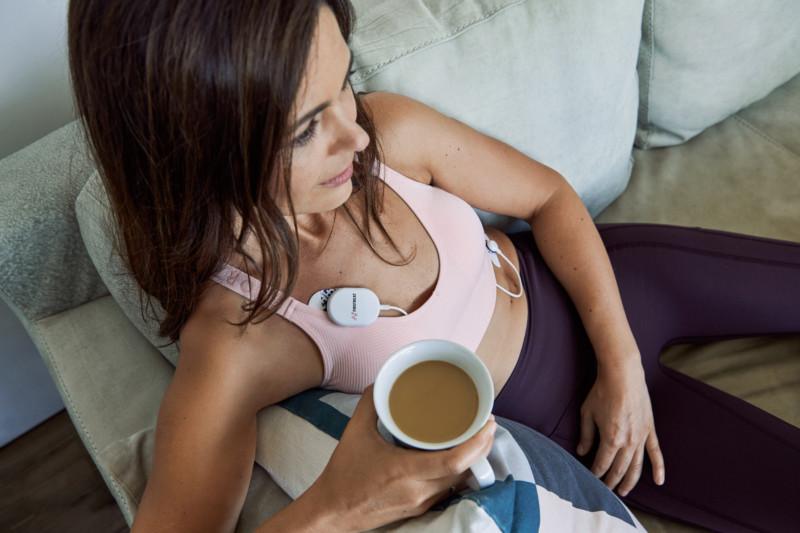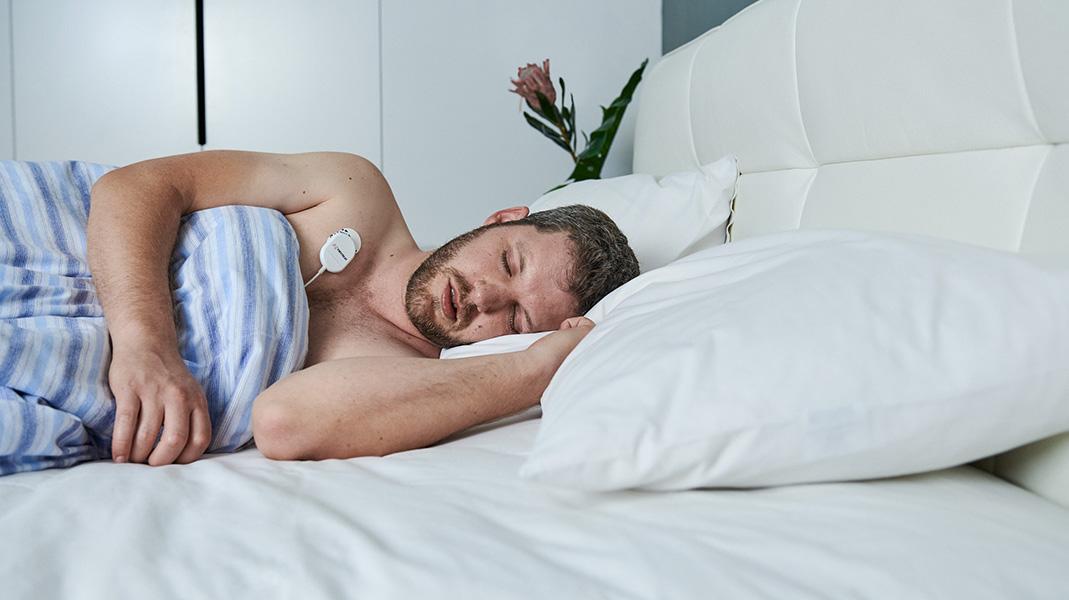
This blog focuses on some common topics and questions surrounding good quality sleep. The Q&A is based on questions received during our Sleep webinar with Sleep Expert and Author Dr. Nerina Ramlakhan.
Sufficiently long, restorative sleep is a foundation of well-being that has a powerful effect on our health and performance, but getting it is not a sure thing. The Sleep Foundation defines good quality sleep as sleeping for at least 85% of the total time in bed, falling asleep in under 30 minutes, waking up max. once per night (for less than 5 minutes), and being awake for less than 20 minutes after initially falling asleep.
These criteria are useful as quantifiers in sleep studies but can be difficult to track in real life without breaking good sleep hygiene rules, such as looking at the clock. Thinking about your sleep metrics too literally can also skew your focus. Data can highlight areas to work on but listening to your body should not be ignored.
When we discussed how to support and evaluate good sleep, Dr. Nerina highlighted that how you feel when waking – and throughout the day – is an important sleep “metric” in itself. If you feel refreshed, the chances are that you slept enough, and well. The danger is that we can get so used to feeling tired that we no longer recognize the feeling of being tired. That’s where sleep data can help.
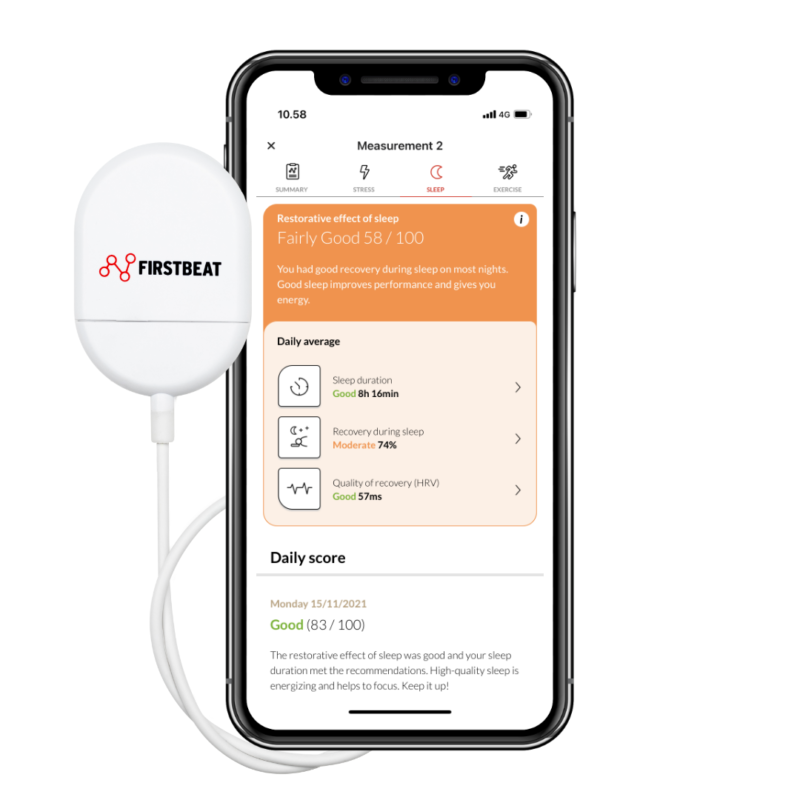
An example of sleep data from the Firstbeat Life app, providing feedback about the client’s sleep period.
These sorts of issues were raised in the questions we received during the recent webinar. So, let’s answer a selection and hopefully help give you a good night’s rest.
Questions About Sleep Duration and Rhythm:
Question: If you go to bed at 9:30/10pm, what time should you wake up?
Answer:
Q: What does “circadian rhythm” mean and how can you support it?
A: Circadian rhythm is an internal process that regulates our sleep–wake cycle and repeats roughly every 24 hours. It is supported by a regular sleep schedule as well as natural fluctuation in day and night hormones, daylight and darkness, and body temperature. Irregular sleep times, heavy use of stimulants or alcohol, jetlag, and chronic stress can mess with this rhythm. You can support the circadian rhythm with a healthy lifestyle, balanced diet, being active, spending time outside during the day, and switching off in the evening (lights and devices, as well as your mind and body!). Our natural sleep hormone melatonin support sleepiness in the evening and observing good sleep guidelines allows melatonin to work for us. Some people take a melatonin supplement, especially if they are struggling with their sleep rhythm or to combat jetlag.
Q: How do we find our natural rhythm? Does the time we naturally fall asleep define us as ‘owls’ or ‘larks’?
A: There are questionnaires to help determine your chronotype, but the natural tendency to fall asleep and wake up early or late is a good estimate. The share of us that are “morning larks” or “night owls” isn’t set in stone, but some experts suggest that only about 10-15% of us are extreme forms of either type, with the rest somewhere in between.
Trying to follow your natural rhythm improves the odds of getting a good sleep, but real life tends to interfere. Most people’s daily rhythm is set by work, school, and family schedules, which might not match their natural rhythm, but we can make choices that support the natural rhythm. An owl who must wake up early needs to pay attention to their evening routine and avoid the temptation to turn the rhythm on its head over the weekend. A lark should go to bed early, when feeling sleepy, instead of powering through and trying to stay up late. Otherwise, it’s tough to get enough sleep if the eyes pop open at 5am!
Q: What are your thoughts on napping?
A: The main time for sleep should be during the night (unless you are a shift worker), but a short power nap (15-25 mins) early in the afternoon or right after work can be a good energizer and usually doesn’t disturb overnight sleep. People who wake up very early can benefit from a short nap – but set an alarm so you don’t end up sleeping for two hours!
Questions About Falling Asleep and Disrupted Sleep:
Q: What can I do if I feel tired but when my head hits the pillow my mind starts racing?
A: This is a common challenge and worth experimenting with to find out what works. Scrolling through work emails in the evening is a bad idea for anyone who recognizes this tendency.
Well before bedtime, start slowing down and get ready for sleep with a routine to “leave the day behind”. Some find it helpful to write a list of what’s ahead the next day to help get some closure on the day. A perfectionist mind wants to get it all done, but we need to learn to accept our limits. You can also try some activities that help slow your mind down: classical or meditation music, meditation routines, breathing exercises, nature sounds, sleep stories, etc.
Q: I have clients who complain of waking up in the middle of the night, for example to go to the loo, which disrupts their sleep. What’s your advice?
A: Short wakeups like this are rarely a problem. In Firstbeat measurements, a bathroom break doesn’t usually even interrupt a parasympathetically dominant recovery state. If you tend to go many times per night, make sure you’re not over-hydrating in the evening.
Personally, I wake up multiple times every night. I shift positions to get comfortable and try not to pay attention to the time. Instead, I try to stay relaxed, breathe calmly and drift back to sleep. Most of the time this works, but if I find myself tossing and turning for a longer time, getting up to stretch, read, or listen to calm music can help. Prioritizing enough time for sleep means I usually feel well rested, despite the admittedly annoying wakeups.
Questions About Diet:
Q: How soon after waking should we eat breakfast if we feel stressed/tired? Are there any foods you recommend?
A: Dr. Nerina discussed this and her key points were: Eat breakfast within 30-45 minutes of waking, especially on days when you feel stressed or have a demanding day ahead. Ensure that you include a good source of protein, such as nuts or eggs. And don’t overload with carbs because they can make you feel sleepy after the initial boost.
Questions About Health – Hormones/Menopause/Illness:
Q: I fall asleep easily and wake up 8 hours later, but the quality of sleep is poor, particularly during ovulation when my hormones peak. Any ideas how to improve this?
A: There’s evidence that, for example, heart rate variability level varies during the menstrual cycle due to hormonal fluctuations, and the individual experience (pain, discomfort) during the cycle also varies a lot. All this can lead to poorer sleep quality at different times of the month (subjectively, and in the data). We can’t change the hormonal cycle, but during the challenging times, we can pay special attention to a calm pre-sleep routine, eat foods that support sleep, and avoid alcohol and other known stress factors.
And, if you sleep 8 hours straight, there’s a good chance you’re getting good restoration in that time, even if the ‘quality’ is not optimal.
Q: Can you discuss menopause. My clients are doing the right things but not getting enough recovery in sleep.
A: There are no simple solutions for menopause and sleep, unfortunately, as many of us have discovered. With severe symptoms, and if your quality of life suffers significantly despite doing the right things, it’s good to discuss with a gynaecologist to determine if hormone replacement therapy might be called for.
We should structure the day in such a way that it supports the natural hormonal cycle – staying active during the day and slowing down in the evening helps melatonin secretion kick in. A melatonin tablet can help, as can some natural supplements or herbs that Dr. Nerina mentions in the webinar. Eating enough nutritious food, avoiding alcohol, and exercising regularly (but not too intensively) can help. And when you do have that horrible sleep (maybe with hot flashes and heart rate racing), be kind to yourself the next day and try to have a few extra moments of recovery. Daytime recovery can help keep your body battery charged if you cannot count on a great night‘s sleep.
Small Choices Can Make a Big Difference
Firstbeat’s HRV-based measurements focus on the balance between the sympathetic (red) and parasympathetic (green) nervous systems to reveal if the body is recovering physiologically during sleep. And what you do during the day impacts how you recover overnight, as the below example from a Firstbeat Life measurement makes clear.
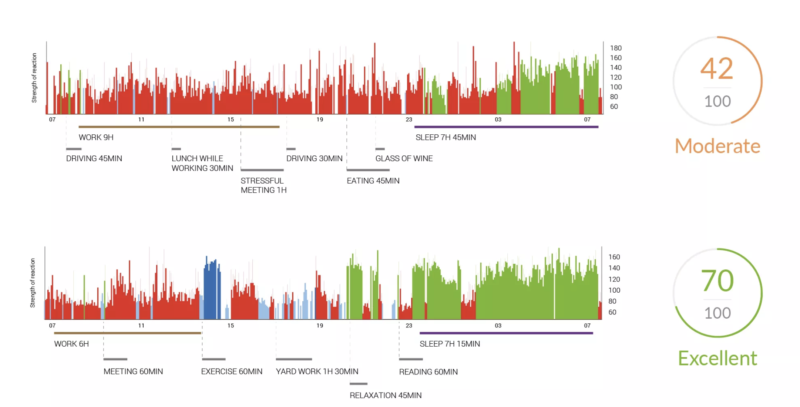
Contrasting Firstbeat Life daily graphs. Graph A shows very little recovery during the day, with stress levels increasing in the evening and leading to not-so-great overnight recovery. Graph B includes physical activity after work as well as conscious recovery activities in the evening and improved overnight recovery.
Using data like this smartly can help you learn how different daily behaviors and events can improve your ability to wind down, get some recovery and, ultimately, sleep better. Identify when you recover and do that activity more often. Notice if your recovery is worse after you had a few drinks or coffee late in the day? Use the data to make behavioral changes or small adjustments to your daily routines.
Many of us need to work hard for good sleep and be mindful of different good and bad habits. But sleep is the foundation of our well-being, so it’s worth paying attention to. Dr. Nerina recommended creating good habits and being kind to ourselves rather than striving for perfection, and I could not agree more. This attitude can boost well-being and sleep more than getting stressed about trying to adhere to every guideline.
Want to find out how you are recovering during sleep? Firstbeat Life provides very accurate data and informative insights about your sleep and your stress and recovery balance. Read more!
You might also be interested in

How to Keep Your Stress Levels in Check When Hybrid Working
The COVID-19 pandemic forced millions of people into remote work and we have learned that it’s possible to do a lot of jobs and work tasks remotely. Hybrid working, which…

Well-Being of the Mind and the Body Go Hand in Hand – Tips for Training Your Mind to Beat Stress
The body and the mind are closely interconnected. If your physical health is challenged, it will quickly affect your mental well-being, or if your mind is struggling, it’s reflected in…
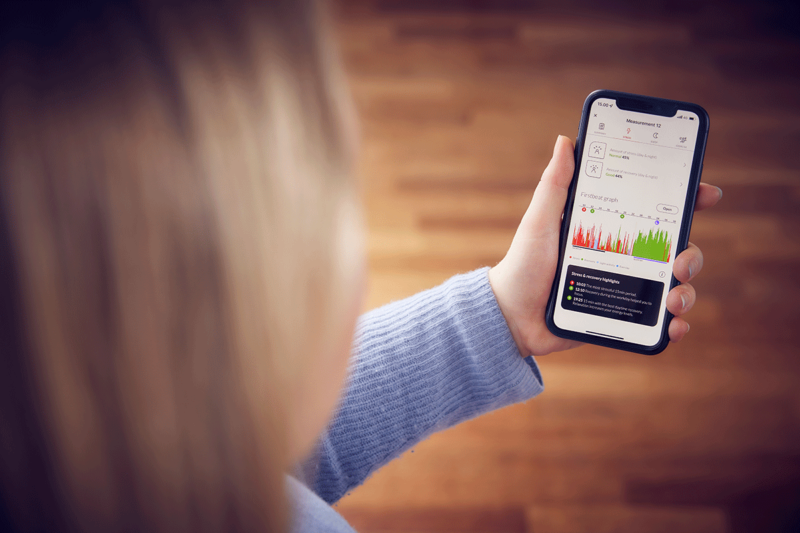
New Well-Being Data Reveals the Impact of Remote Working on Everyday Life
Since coronavirus began spreading across the world in early 2020, we have made substantial changes to our everyday lives, from the way we work, to our leisure time and daily…


